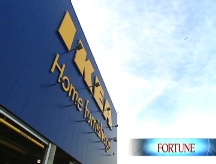At IKEA, green is gold
The Swedish furniture chain aims to save money while protecting the planet.
 |
| IKEA's alternative to the plastic bag is this 59-cent tote, called the Blue Bag. |
(Fortune) -- You probably know IKEA as a seller of affordable, stylish furniture that comes in "flat packs" - with more than a little assembly required.
To keep prices down, IKEA asks customers to put together their own desks, chairs and bookshelves. That reflects the company's roots in Sweden, where it was founded in the 1940s by Ingvar Kamprad, a farmer's son who sold pens and seed packets to his frugal neighbors. (The IKEA name comes from his initials, those of the family farm, Elmtaryd, and the nearest village, Agunnaryd.)
The flat packs also serve another purpose: They lighten IKEA's environmental footprint. A delivery truck filled with flat-packed chairs can carry the equivalent of six trucks of fully-assembled chairs. "We must stop transporting air," said Anders Dalhvig, IKEA's president and CEO. So the next time you struggle to get an IKEA bookshelf to stand straight, you can take solace in knowing that you are doing the planet a favor.
Today, IKEA's commitment to the environment goes well beyond flat packs. The fast-growing, privately-held company - sales last year were $21.2 billion Euros (about $27 billion) - has promised to buy more of its wood from sustainably managed forests, to use fewer raw materials in its products, to buy renewable energy (including solar panels for a store that opened in June in Brooklyn) and to curb business travel.
This year, IKEA drew attention by eliminating plastic bags from its 35 stores in the United States, and the company opened a new factory in Danville, Va., to be closer to American consumers.
I recently met with Dahlvig in New York, after he spoke to the annual conference of Business for Social Responsibility, a group of companies seeking to find more responsible ways to do business. (General Electric (GE, Fortune 500) CEO Jeffrey Immelt also spoke to the group.) The 51-year-old CEO, who has been with the company since 1984, told me that when he started IKEA's sustainability efforts about a decade ago, he had to persuade other staffers that the effort was worthwhile.
He began by asking a series of questions: "Is environmental and social work good for business? What right do we have to put demands on our suppliers? How fast should a company like IKEA move on sustainability?"
Today, he says, there's no longer any doubt about whether taking environmental and social concerns seriously is good for business. But questions remain about how fast to move, and at what cost, and how customers will respond.
One example: Buying wood from forests that are certifiable by the independent Forest Stewardship Council. Eventually, IKEA would like all of its wood to be FSC-certified. Today, only about 5-6% of the wood bought by IKEA meets that standard. Dalhvig says he's "disappointed in the progress we've made."
Cost is the big obstacle. To hold down prices, IKEA buys wood from low-cost producers in Russia, eastern Europe and Asia. "If we were to source our wood products only from Sweden, say, or other western countries, it wouldn't be a problem," Dalhvig says. But IKEA buys from "countries like China, Russia and Bulgaria where there is hardly any certified product."
This might sound like a copout were it not for the fact that IKEA is working with the World Wildlife Fund to help owners of timber land in those countries improve their practices and achieve certification.
"We do the planet a bigger service if we help improve the management of forestry in these countries," Dalhvig said. He expects that about 30% of IKEA's wood will be FSC-certified in the next few years.
By then, IKEA will also have reduced the volume of wood that it uses. The company is substituting wood veneer products that are just as attractive and functional as solid wood. "I would not be surprised if solid wood is phased out of our furniture in the next few years," Dahlvig says - assuming that customers don't resist.
On the issue of climate change, IKEA has taken an expansive view of its greenhouse gas emissions. When you include the extraction of raw materials, the use of its products in the home (like lamps that need electricity), customer transportation to the stores along with the operation of its stores, factories and offices, the company says it emits about 27 million tons of carbon dioxide into the atmosphere every year. IKEA's direct emissions are about 3.2 million tons. (By comparison, the biggest emitter among coal-fired power plants in the United States, a plant in Juliette, Ga., emits about 25 million tons.)
To reduce its climate footprint, IKEA uses renewable energy for 45% of its heating needs and 20% of its electricity. It held 9,000 Web-based meetings last year, saving money and emissions. It is shrinking its supply chain, locating factories closer to markets and urging suppliers to do the same. (Its new plant in Danville, a furniture town in southern Virginia, employs about 300 people.) Eliminating plastic bags from IKEA's U.S. stores reduced emissions and waste. The company had been using about 70 million plastic bags a year.
IKEA employs about 127,800 people, and Dahlvig says he no longer has to persuade them to work to make the company sustainable, as he once did. "Today, the pressure is from underneath," he said. "They want us to do more." ![]()
-
 The retail giant tops the Fortune 500 for the second year in a row. Who else made the list? More
The retail giant tops the Fortune 500 for the second year in a row. Who else made the list? More -
 This group of companies is all about social networking to connect with their customers. More
This group of companies is all about social networking to connect with their customers. More -
 The fight over the cholesterol medication is keeping a generic version from hitting the market. More
The fight over the cholesterol medication is keeping a generic version from hitting the market. More -
 Bin Laden may be dead, but the terrorist group he led doesn't need his money. More
Bin Laden may be dead, but the terrorist group he led doesn't need his money. More -
 U.S. real estate might be a mess, but in other parts of the world, home prices are jumping. More
U.S. real estate might be a mess, but in other parts of the world, home prices are jumping. More -
 Libya's output is a fraction of global production, but it's crucial to the nation's economy. More
Libya's output is a fraction of global production, but it's crucial to the nation's economy. More -
 Once rates start to rise, things could get ugly fast for our neighbors to the north. More
Once rates start to rise, things could get ugly fast for our neighbors to the north. More












